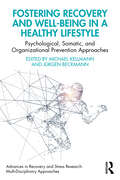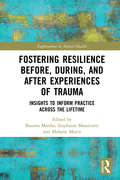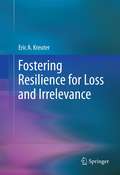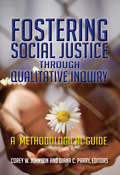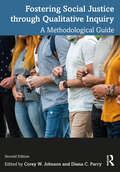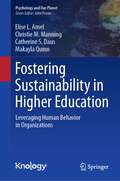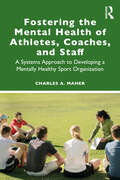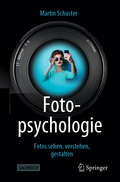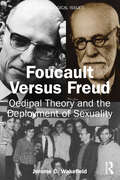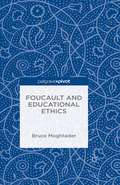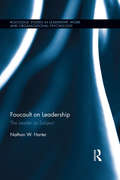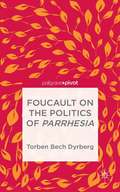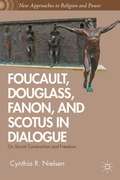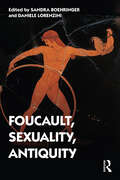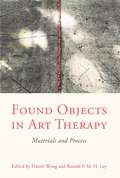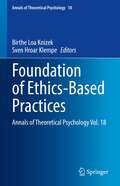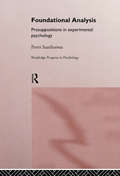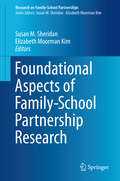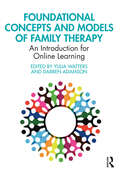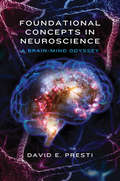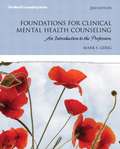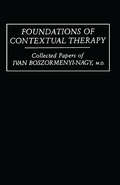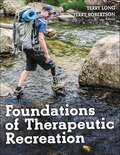- Table View
- List View
Fostering Recovery and Well-being in a Healthy Lifestyle: Psychological, Somatic, and Organizational Prevention Approaches (Advances in Recovery and Stress Research)
by Michael Kellmann Jürgen BeckmannThis insightful book addresses recovery as a comprehensive concept for prevention of health-threats in modern societies through active lifestyles. Several areas of society are addressed, such as sports, work environments, and the military. Internationally renowned experts from different scientific disciplines present results of empirical research as well as applied intervention techniques to effectively manage stress and promote recovery in healthy lifestyles.Recognizing the systemic nature of stress and recovery is critical to designing effective interventions and policies. By promoting a balance between stress and recovery in physiological, psychological, and social terms, individuals and societies can build resilience, promote optimal well-being, and mitigate the negative effects of chronic stress. This book focuses on key research in the area of recovery and healthy living and addresses psychological, somatic and organizational prevention strategies that foster recovery and healthy lifestyles in society. It offers an expanded understanding of recovery in the health field and applies this to different areas, such as the workplace.Though written for the scientific community, the book will also benefit applied health scientists, instructors, and students, as well as readers interested in applying effective well-being and recovery techniques in their own lives.
Fostering Resilience Before, During, and After Experiences of Trauma: Insights to Inform Practice Across the Lifetime (Explorations in Mental Health)
by Buuma MaishaThis edited volume recognizes that resilience, and the most effective means of harnessing it, differ across individuals, contexts and time. Presenting chapters written by a range of scholars and clinicians, the book highlights effective evidence-based approaches to nurturing resilience, before, during and after a traumatic experience or event. By identifying distinct therapeutic tools which can be used effectively to meet the particular needs and limitations associated with different age groups, clients and types of experience, the volume addresses specific challenges and benefits of nurturing resilience and informs best practice as well as self-care. Approaches explored in the volume include the use of group activities to teach resilience to children, the role of sense-making for victims of sex trafficking, and the ways in which identity and spirituality can be used to help young and older adults in the face of pain and bereavement. Chapters also draw on the lived experiences of those who have engaged in a personal or guided journey towards finding new meaning and achieving posttraumatic growth following experiences of trauma. The rich variety of approaches offered here will be of interest to clinicians, counsellors, scholars and researchers involved in the practice and study of building resilience, as well as trauma studies, psychology and mental health more broadly. The personal and practice-based real-life stories in this volume will also resonate with individuals, family and community members facing adversity.
Fostering Resilience for Loss and Irrelevance
by Eric A. KreuterThe compensating construct of resiliency, itself, has not been compared to the problem of loss of relevancy. Therefore, there is an open corridor for the enlightened therapist, career coach, or mentor to appropriately guide a troubled person with targeted challenges to transform themselves into a newly thriving being. This book explores the topic in detail with references to the literature where prior theory can be applied to advance this topic further. Anecdotal evidence supporting the authors' perspective is presented, including several brief case studies of individuals who have thrived following cessation of their prior careers.
Fostering Social Justice through Qualitative Inquiry: A Methodological Guide
by Corey W Johnson Diana C ParryQualitative researchers increasingly flock to social justice research to move beyond academic discourse and aid marginalized communities and groups. This is the first textbook to address the methods of conducting qualitative research using a social justice paradigm. The book addresses the differences that a social justice stance requires from the researcher, then discusses how major qualitative methodologies are employed to create social justice in both the process and products of qualitative research. In this book-chapters cover grounded theory, phenomenology, ethnography, participatory action research, and other key qualitative designs;-methods chapters are written by experts in that methodology;-case studies illustrate show this style of research in action;-material is tightly organized and edited for course use although there are multiple authors.
Fostering Social Justice through Qualitative Inquiry: A Methodological Guide
by Diana C. Parry Corey W. JohnsonNow in its second edition, Fostering Social Justice through Qualitative Inquiry, addresses the methods of conducting qualitative research using a social justice paradigm. Qualitative researchers increasingly flock to social justice research to move beyond academic discourse and aid marginalized, oppressed, or less-powerful communities and groups. The book addresses the differences that a social justice stance requires from the researcher, then discusses how major theories and qualitative methodologies are employed to create social justice in both the process and products of qualitative research. Snapshot theory chapters introduce the foundations of theories like feminism, critical race theory, queer theory, and many more. Robust methodological chapters cover grounded theory, phenomenology, ethnography, participatory action research, and other key qualitative designs. Chapters are written by experts in the specific theory or methodology, and exemplars of the authors work illustrate this style of research in action. New to this edition: • Expanded attention to the theories most commonly associated with social justice research by authors who have put it to use • Methodological chapters on autoethnography, collective memory work, digital methods and postqualitative inquiry • Chapter Reflection Questions to help students and their supervisors/instructors apply what they’ve learned • Recommended readings from each author with annotations to encourage additional exploration This established textbook will be suitable for graduate students and scholars in qualitative inquiry in a range of disciplines, including Education and Gender and Sexuality, Communication, Leisure Studies, and across the social sciences.
Fostering Sustainability in Higher Education: Leveraging Human Behavior in Organizations (Psychology and Our Planet)
by Elise L. Amel Christie M. Manning Catherine S. Daus Makayla QuinnSustainability is one of the most critical challenges facing humanity. Changing Higher Education Institutions (HEIs) is crucial to overcoming that challenge because of their roles providing cutting edge knowledge and preparing our future citizens, workforce, and thought leaders. Many educational organizations are already leading the way toward sustainability, but a multitude of others still have substantial work to do. The field of Industrial/Organizational (I/O) psychology offers a wealth of knowledge about human behavior within organizations that can support the changes essential for moving toward sustainability. This book serves as a one-stop-shop for individuals intent on engaging their HEIs in sustainability, but who have little experience with organizational change or have encountered barriers to progress. It synthesizes the empirical literature and describes through accessible prose the psychological principles to encourage structural, procedural, social, and behavioral changes in support of a socially just and environmentally sustainable future.
Fostering the Mental Health of Athletes, Coaches, and Staff: A Systems Approach to Developing a Mentally Healthy Sport Organization
by Charles A. MaherThis book describes a systems approach for fostering the mental health of athletes, coaches, and staff in sport organizations at professional, collegiate, and secondary school levels. Through this approach, readers can collaborate effectively with a range of professionals in sport organizations, helping to create a mentally healthy entity. Fostering the Mental Health of Athletes, Coaches, and Staff includes a set of sequential, interrelated chapters that detail precise steps along with practitioner exercises. Following an introductory chapter about the evolution of mental health in sport organizations, the systems approach is overviewed in terms of its constituent dimensions. Chapter-by-chapter guidance then is provided about the following activities: Creating a vision and direction for mental health in a sport organization. Assessing the readiness of a sport organization for mental health initiatives. Identifying and involving people as key contributors to mental health. Assessing the mental and emotional development of athletes, coaches, and staff. Designing and implementing mental health programs and services. Educating and training coaches, staff, and administrators about mental health. Establishing a team environment conducive to mental health. Formulating and enacting mental health policies, plans, and procedures. Coordinating mental skills, life skills, and mental health. Evaluating mental health programs and services. Making decisions about improving mental health initiatives. Through its unique and important nature and scope, as well as being the first of its kind to discuss athlete mental health through this specific lens, this book is essential for licensed sport, clinical, and counseling psychologists, as well as other professionals who communicate and collaborate regarding mental health, including mental performance consultants, athletic trainers, and administrators.
Fotopsychologie: Fotos sehen, verstehen, gestalten
by Martin SchusterEin Bild sagt oft mehr als tausend Worte, und mit dem Fotoapparat ist es leicht, sich eines, oder auch viele Bilder zu machen. Martin Schuster spürt den psychologischen Aspekten der Fotografie nach: Welche Motive werden gewählt? Was verbindet Fotografen und Fotografierte? Was erleben wir beim Betrachten eigener und fremder Fotos? Er zeigt, wie Fotos genutzt werden können, um die Vergangenheit wieder lebendig zu machen und wie Presse- und Werbefotografen mit Fotos an unsere Wünsche und Sehnsüchte appellieren. Hinweise zur Alltagsfotografie ermuntern dazu, ungeachtet künstlerischer Ambitionen die Fotografie für das eigene Leben intensiver und persönlicher zu nutzen. Diese dritte Auflage wurde grundlegend überarbeitet und aktualisiert. Die Möglichkeiten der omnipräsenten Digital- und Handyfotografie werden beleuchtet, ebenso wie der unseren Alltag immer stärker prägende Einfluss der massenhaften bildhaften Kommunikation im Internet. Prof. Dr. Martin Schuster, geb. 1946, Studium der Psychologie, ab 1972 Assistent und Akademischer Rat an der Universität Köln, pensioniert seit 2008.Zahlreiche Veröffentlichungen zu den Themen Kreativität, Kunstpsychologie, Kinderzeichnung und Kunsttherapie.
Foucault Versus Freud: Oedipal Theory and the Deployment of Sexuality (Psychological Issues)
by Jerome C. WakefieldIn Foucault Versus Freud, Jerome C. Wakefield offers a novel analysis of one of the great intellectual clashes of our times, the attack on Sigmund Freud's influential sexual theories by the eminent French philosopher and historian of ideas Michel Foucault.Starting from Foucault's question, "What makes the psychoanalytic theory of incest acceptable to the bourgeois family?", and drawing on Foucault's relatively unexplored published lectures as well as his celebrated History of Sexuality, Vol. 1, Wakefield evaluates Foucault's argument that there is a continuity between the two-century medical anti-masturbation crusade and Freud's theory, providing the reader with an accessible introduction to Foucault's conceptual innovations including power/knowledge, the deployment of sexuality, and the use of surveillance and confession as tactics in medicalizing sexuality and reshaping family life.Rather than allowing the argument to stay at the evidentially uncertain level one often finds in Foucault's writings, Wakefield undertakes close readings of both Freud's "seduction-theory" texts and later Oedipal-period texts to test whether Foucault's provocative arguments find support or disconfirmation. Despite identifying weaknesses in Foucault's position, Wakefield argues that a careful look at Freud's sexual theories through Foucault's theoretical lens changes forever the way one sees Freud's theory—and has the potential to help psychoanalysis move forward in a constructive way.This book is written to be understandable for those who are not steeped in philosophy or familiar with Foucault's philosophy, offering a lucid introduction to Foucault's ideas and his clash with Freud that will be of interest to clinicians, students, and scholars alike.
Foucault and Educational Ethics
by Bruce MoghtaderIn his works on ethics, Foucault turned towards an examination of one's relationship with oneself and others. This differs from the modern approaches that explore the relationship between and the responsibilities of actors to each other by adopting criteria. Ethical criteria engender assumptions about the actors by focusing on their responsibilities. Instead of relying on criteria, Foucault's writing and lectures contributed to an awareness of the activities we take upon ourselves as ethical subjects. His reconstruction of the Greco-Roman ethics seeks to examine the possibilities of the reconstitution and transformation of subjectivity. Through this, he offers an avenue of understanding the formation of ethical subjects in their educational interrelationships.
Foucault on Leadership: The Leader as Subject (Routledge Studies in Leadership, Work and Organizational Psychology)
by Nathan W. HarterMichel Foucault, one of the most cited scholars in the social sciences, devoted his last three lectures to a study of leader development. Going back to pagan sources, Foucault found a persistent theme in Hellenistic antiquity that, in order to qualify for leadership, a person must undergo processes of subjectivation, which is simply the way that a person becomes a Subject. From this perspective, an aspiring leader first becomes a Subject who happens to lead. These processes depend on a condition of parresia, which is truth-telling at great risk that is for the edification of the other person. A leader requires a mentor and advisors in order to lead successfully, while also developing the capacity in one’s own mind to heed the truth. In other words, a leader must learn how to guide oneself. A valuable contribution to the field of leadership studies, this book summarizes these last lectures as they pertain to the study and practice of leadership, emphasizing the role of ethics and truth-telling as a check on power. It then presents several other contexts where these same lessons can be seen in practice, including in the life of Alexander Solzhenitsyn, whose career as a writer epitomized speaking truth to power, and somewhat surprisingly in the United States military, in response to its twenty-first century mission of counterinsurgency.
Foucault on the Politics of Parrhesia
by Torben Bech DyrbergFoucault saw the notion of parrhesia (truth-telling) as the most important factor for how governments could and should communicate with their people and vice versa. This important collection compiles and analyses Foucault's views on parrhesia to shed new light on his ideas on the importance of truth-telling in democracies.
Foucault, Douglass, Fanon, and Scotus in Dialogue
by Cynthia R. NielsenThrough examining Douglass's and Fanon's concrete experiences of oppression, Cynthia R. Nielsen demonstrates the empirical validity of Foucault's theoretical analyses concerning power, resistance, and subject-formation. Going beyond merely confirming Foucault's insights, Douglass and Fanon expand, strengthen, and offer correctives to the emancipatory dimensions of Foucault's project. Unlike Foucault, Douglass and Fanon were not hesitant to make transhistorical judgments condemning slavery and colonization. Foucault's reticence here signals a weakness in his account of human being. This weakness sets him at cross-purposes not only with Scotus, but also with Douglass and Fanon. Scotus's anthropology provides a basis for transhistorical moral critique; thus he is a valuable dialogue partner for those concerned about social justice and human flourishing.
Foucault, Sexuality, Antiquity
by Sandra BoehringerFoucault, Sexuality, Antiquity, published for the first time in English, takes an interdisciplinary approach to exploring how the work of Michel Foucault has influenced studies of ancient Greece and Rome. Foucault’s The History of Sexuality has had a profound and lasting impact across the humanities and social sciences. In the two volumes dedicated to pagan antiquity, Foucault provided scholars with new questions for addressing ancient Greek and Roman societies, and an original epistemological framework for thinking about eroticism and about the processes by which individuals are led to recognize themselves as the subjects of their desires. Now, decades later, the scholars in this volume explore Foucault’s role in shaping and reorienting discussions of antiquity in the fields of philosophy, gender studies, and psychoanalysis, among others. A multidisciplinary exploration of Foucault’s work and its relationship to our understanding of ancient Greco-Roman societies, Foucault, Sexuality, Antiquity will be of interest to students and scholars in classical studies, philosophy, gender studies, and ancient history.
Found Her: The most gripping and emotional thriller you'll read in 2021
by NJ MackayThe most gripping, emotional and redemptive psychological thriller of 2021 - for fans of Erin Kinsley, Lisa Jewell, Louise Jensen, Phoebe Morgan, CL Taylor, Cara Hunter and KL Slater...'Dark, gripping, unexpected. Insanely good - like, Dark Places good' ELLE CROFT, author of The Guilty Wife'Brilliantly plotted, tense and atmospheric. You will doubt and suspect everyone. Loved it' RACHAEL BLOK, author of Under The Ice'Grips you from the first line through to the nail-biting conclusion. Psychological suspense at its best' VICTORIA SELMAN, author of Blood for Blood'I binge read this clever, unexpected, brilliantly plotted thriller because I literally could not put it down. Incredible' CLARE EMPSON, author of HIM**************Belle Moriarty was there one moment and gone the next. Ten years ago, she disappeared walking home from school, under the supervision of her older sister Eve. Eve has never recovered from the guilt of turning her back.But then she receives a phone call that changes everything. Belle has been found - alive.But who took her? Why did they keep her alive all these years? And now that Belle has escaped, will they try to silence her for good?With Belle in a coma and Eve receiving increasingly terrifying threats, she must discover the kidnapper's identity before they return to finish what they started...**************Praise for NIKI MACKAY:'A punchy, pacy thriller - I devoured it in a single day' HELEN CALLAGHAN'Absolutely gripping' DAME JENNI MURRAY'Totally engaging, fast paced and edgy...completely captivating' ELLE CROFT'I couldn't put it down...a must read...Niki is brilliant and talented' PHOEBE MORGAN'As addictive as Killing Eve' THE LADY'Had me hooked within two pages - every bit as much appeal as The Girl On The Train' ROBERT SCRAGG'A humdinger of a thriller...a maze of lies, deceit and danger'EVENING TELEGRAPH
Found Her: The most gripping and emotional thriller you’ll read in 2021
by NJ MackayThe most gripping, emotional and redemptive psychological thriller of 2021 - for fans of Erin Kinsley, Lisa Jewell, Louise Jensen, Phoebe Morgan, CL Taylor, Cara Hunter and KL Slater...'Dark, gripping, unexpected. Insanely good - like, Dark Places good' ELLE CROFT, author of The Guilty Wife'Brilliantly plotted, tense and atmospheric. You will doubt and suspect everyone. Loved it' RACHAEL BLOK, author of Under The Ice'Grips you from the first line through to the nail-biting conclusion. Psychological suspense at its best' VICTORIA SELMAN, author of Blood for Blood'I binge read this clever, unexpected, brilliantly plotted thriller because I literally could not put it down. Incredible' CLARE EMPSON, author of HIM**************Belle Moriarty was there one moment and gone the next. Ten years ago, she disappeared walking home from school, under the supervision of her older sister Eve. Eve has never recovered from the guilt of turning her back. But then she receives a phone call that changes everything. Belle has been found - alive. But who took her? Why did they keep her alive all these years? And now that Belle has escaped, will they try to silence her for good? With Belle in a coma and Eve receiving increasingly terrifying threats, she must discover the kidnapper's identity before they return to finish what they started...**************Praise for NIKI MACKAY:'A punchy, pacy thriller - I devoured it in a single day' HELEN CALLAGHAN'Absolutely gripping' DAME JENNI MURRAY'Totally engaging, fast paced and edgy...completely captivating' ELLE CROFT'I couldn't put it down...a must read...Niki is brilliant and talented' PHOEBE MORGAN'As addictive as Killing Eve' THE LADY'Had me hooked within two pages - every bit as much appeal as The Girl On The Train' ROBERT SCRAGG'A humdinger of a thriller...a maze of lies, deceit and danger' EVENING TELEGRAPH
Found Objects in Art Therapy: Materials and Process
by Daniel Wong and Ronald P. M. H. LayThis book shows how art therapists can use found objects in their work with clients. Found objects can be a highly affordable, imaginative and creative way of working, and are particularly effective when working with marginalised populations and clients who have experienced trauma. This edited collection contains chapters from a wide variety of contributors from around the world and covers a vast array of topics, including the use of found objects in clinical settings, community and art practice, pedagogy and self-care.This is the ideal resource for any art therapist wishing to explore the use of this non-traditional medium to enrich their practice.
Foundation of Ethics-Based Practices: Annals of Theoretical Psychology Vol. 18 (Annals of Theoretical Psychology #18)
by Sven Hroar Klempe Birthe Loa KnizekThis book contrasts earlier textbooks on “evidence-based practices.” Whereas the latter is a slogan that call for scientific evidence to be used in standardized treatment manuals, ethics-based practices call for individualized treatment that makes the situation meaningful for the patient. The main argument for changing the treatment design from being evidence-based to one based on ethics, is the hypothesis that good health care is based on treatment which makes the situation positive and meaningful for the patient. The awareness for this is primarily provided by ethical considerations.
Foundational Analysis: Presuppositions in Experimental Psychology (Routledge Progress in Psychology)
by Pertti SaariluomaIn a critical analysis of the asumptions underlying experimental psychology, Pertti Saariluoma urges social scientists to reflect upon their procedures and methodology. He has revisited the philosophy of science to find a new way of applying its methods to psychology. Foundational Analysis shows how it is possible to analyze existing methodological arguments and find loopholes in them, and raises new issues for the rationale behind empirical technique. It will be of interest to researchers and students in cognitive science and other social sciences, and the philosophy of science.
Foundational Aspects of Family-School Partnership Research
by Susan M. Sheridan Elizabeth Moorman KimThis volume focuses on how family-school partnerships are conceptualized, defined, and operationalized as well as the research that is needed to advance these foundational issues. Each chapter integrates prevailing approaches into a research-based framework for supporting learning from pre-K through high school. The book incorporates structural and relational methods into the larger context of educational processes to promote research about collaboration and to improve the academic and behavioral development of students. Diverse theories and models of family-school alliances demonstrate approaches and interventions that are goal-directed and strengths-based, respectful and responsive. In addition, the book analyzes cognitive, behavioral, and interpersonal aspects of partnership and discusses different methods of assessing parental involvement and student outcomes. Included in the coverage are innovative, agenda-setting discussions on: Definitions and conceptual frameworks of family-school partnerships. Need-satisfying partnerships. Diverse parent perspectives and participation. Measurement of family-school partnership constructs over time. Foundational Aspects of Family-School Partnership Research is an essential resource for researchers, professionals, and graduate students in child and school psychology, educational policy and politics, family studies, developmental psychology, sociology of education, sociology, and anthropology.
Foundational Concepts and Models of Family Therapy: An Introduction for Online Learning
by Yulia Watters Darren AdamsonThis textbook aims to introduce students to the foundational concepts of the marriage and family therapy field, providing a comprehensive overview of a range of models and their practical application. Designed specifically for distance-learning, Yulia Watters and Darren Adamson bring together a collection of experienced marriage and family therapists to teach the absolute essentials of marriage and family therapy without peripheral or incidental information. Iterative in its presentation, the book introduces important systems concepts, provides a compelling history of family therapy, presents detailed exploration of classical and postmodern approaches to therapy, and covers clinical application and treatment planning. It uniquely follows the course structure of the first institution to receive Commission on Accreditation for Marriage and Family Therapy Education (COAMFTE) accreditation for both master’s and doctoral online programs, giving students the fundamental knowledge they need to help them prepare for their licensing examination and subsequent practice as MFTs. Written for students seeking to be MFT practitioners, this important volume adds a fresh perspective to teaching and application of family therapy.
Foundational Concepts in Neuroscience: A Brain-Mind Odyssey (Norton Series on Interpersonal Neurobiology)
by David E. PrestiKey concepts in neuroscience presented for the non-medical reader. A fresh take on contemporary brain science, this book presents neuroscience—the scientific study of brain, mind, and behavior—in easy-to-understand ways with a focus on concepts of interest to all science readers. Rigorous and detailed enough to use as a textbook in a university or community college class, it is at the same time meant for any and all readers, clinicians and non-clinicians alike, interested in learning about the foundations of contemporary brain science. From molecules and cells to mind and consciousness, the known and the mysterious are presented in the context of the history of modern biology and with an eye toward better appreciating the beauty and growing public presence of brain science.
Foundations For Clinical Mental Health Counseling: An Introduction To The Profession
by Mark S. GerigIn Gerig's Foundations for Clinical Mental Health Counseling, readers get an accurate picture of the mental health counseling profession in its contemporary environment, what the author calls a "professional view from the trenches that is academically informed." Here, future mental health counselors discover a fresh, up-to-date perspective on the profession in the book's descriptions of relevant settings, public policies, and trends that show clearly how counselors can be helpful to their clients, marketable to potential employers, relevant when communicating with stakeholders or public policy makers, and, when applicable, advocates for consumers and the profession.
Foundations Of Contextual Therapy: Collected Papers Boszormenyi-Nagy
by Ivan Boszormenyi-NagyFirst published in 1987. Routledge is an imprint of Taylor & Francis, an informa company.
Foundations Of Therapeutic Recreation
by Terry Robertson Terry LongFoundations of Therapeutic Recreation, Second Edition, introduces students to the many career possibilities in the field of therapeutic recreation. Drawing on the combined wisdom and expertise of editors Terry Long and Terry Robertson, as well as 20 contributing authors who represent a broad spectrum of experiences within the discipline, the text provides the foundational concepts that are essential for understanding the profession.
